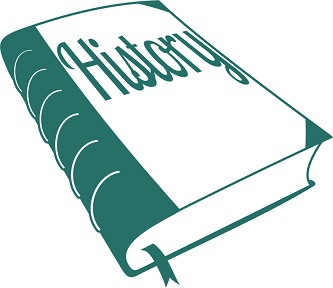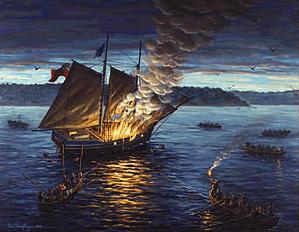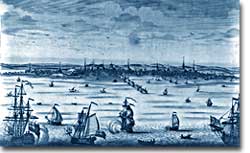
The Declaration of Independence
Lesson Plan
- What is the concept of mercantilism?
- Why were the Navigation Acts so important to the British and why did they generally alienate the colonists?
- What is meant by the term “salutary neglect” and what did it mean for the colonies?
Key questions

Rhode Island Colonists led by John Brown burn the British revenue cutter Gaspee
The British had an empire to run. The way that they kept their economy healthy was through a system called mercantilism. Mercantilism was a popular economic philosophy in the 17th and 18th centuries. In this system, the British colonies were moneymakers for the mother country. The British put restrictions on how their colonies spent their money so that they could control their economies. They put limits on what goods the colonies could produce, whose ships they could use, and most importantly, with whom they could trade. The British even put taxes called duties on imported goods to discourage this practice. This pushed the colonists to buy only British goods, instead of goods from other European countries.
The distance from Britain and the size of the British Empire was an advantage for the colonies. It was expensive to send British troops to the colonies. For many years, the British government’s philosophy was one of “salutary neglect.” This meant that they would pass laws to regulate trade in the colonies, but they did not do much to enforce them. The British knew that the colonies were benefiting from goods from the Dutch, French, and Spanish, however. Eventually, in 1763, they began to enforce many of the trade restrictions and even passed new ones.
The Navigation Acts and the Sugar Act were two of the laws enacted to restrict colonial trade. Acts like these led to rebellion and corruption in the colonies. Colonists, particularly in New England, rebelled against these acts by illegally smuggling goods in and out of the colonies. Ships from the colonies often loaded their holds with illegal goods from the French, Dutch, and Spanish West Indies. The smugglers would pay bribes to British customs officials who were hired to regulate trade in the colonies. These officials also made a modest salary from the British, so they were benefitting from all sides. The American juries that tried smugglers, in times when they were actually caught, rarely found them guilty. Because they were gaining so much power, smugglers increased their secret trade to almost every port in the colonies. It is estimated that over 700,000 British pounds were brought into the American colonies each year at this time.
Trade and Taxation

Boston Harbor, circa 1746, was home to a successful colonial merchant fleet.
England continued to tax the colonies. But since trade and taxation were difficult to control from far away, England made an agreement with the colonies. They would continue to regulate trade but allow colonists the right to levy their own taxes.
You are marching in protest against having to buy goods imported only from Britain, regardless of where they originated. What does your poster say?
The French and Indian War put this delicate agreement to the test. Because the war was expensive, the British believed that colonists should help pay for it. They argued that they had protected the colonists from French and Indian threats. As a result, new taxes were levied by the British, which horrified the colonists.
Between the taxes they imposed and the measures the British Navy took to arrest smugglers, colonists were becoming increasingly angry. American shippers became more and more rebellious against trade restrictions with other countries. All of these actions served as stepping stones to the Revolution.
- What is the concept of mercantilism?
- Why were the Navigation Acts so important to the British and why did they generally alienate the colonists?
- What is meant by the term “salutary neglect” and what did it mean for the colonies?
Start page | The Document | A Reading | Signers | Related Information | Jefferson's Account | Declaration House | Declaration Timeline | Rev. War Timeline | More Resources | Lesson Plan |




